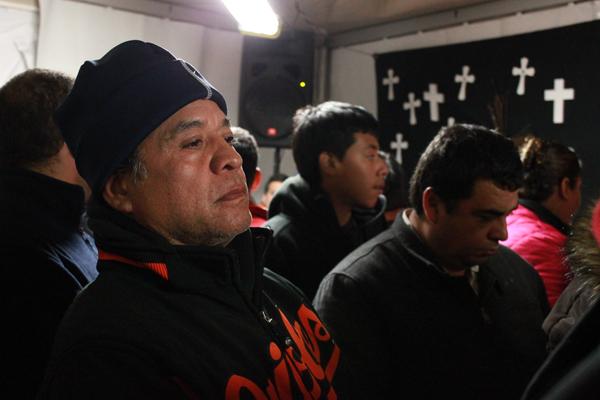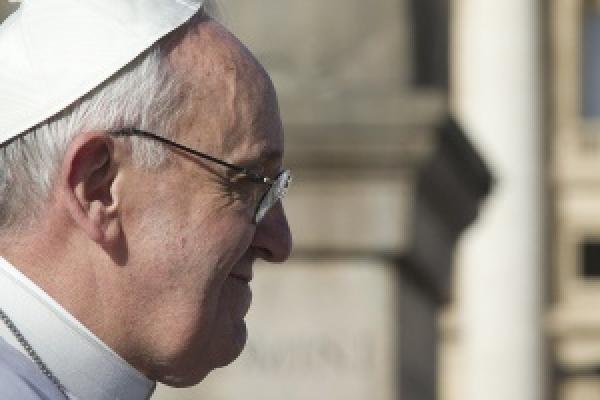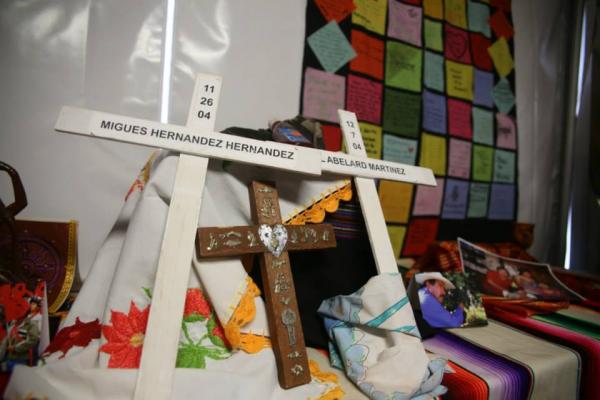I moved into the fasting tent Wednesday morning, Day 16 of my Thanksgiving Fast4Families. I’m now able to drink only water. Committed to fast as long as my body holds out.
The rain Wednesday mixed with snow pelted the tent from all sides. Sometimes the whole tent even swayed in the wind. The fasters sat in their chairs, some having just arrived, a few having lived in the same chair for 16 days now.
We’ve had multiple visitors; a Spanish language television station, a former senator’s top aide who is also the father of one of the fasters, another television station, and a crew of photographers that took our picture for a Thanksgiving Tweet. All that before 2 p.m. on Wednesday.
But the best part has been the fellowship and the discipline of silence.
Pope Francis on Tuesday released his first apostolic exhortation since his election in March. The message, “Evangelii Gaudium” (“The Joy of the Gospel”), challenges Catholics — both laity and clergy — to pay more attention to evangelizing the world.
While most American evangelicals do not usually read papal pronouncements, it would be a shame if we did not familiarize ourselves with Francis’ newest document, for there is much in it that evangelicals could embrace:
I sympathize with the Cheney family this Thanksgiving. Siblings arguing with each other and claiming that Dad is on their side — geez, sounds too familiar for comfort. I have four siblings and when we were kids we were a rough and tumble pack, openly vying for our parents’ approval. We relished ratting each other out. The fickle finger of accusation waving wildly, we’d shout things like “She started it!” “It was his idea!” or “I told her you’d be mad!” Oh, we had a million ways to stay in our parents’ good graces.
You’d think it all might have been about avoiding punishment, and I guess that was part of it. But even though our parents can’t ground us anymore, we tend to search their faces as if we were contestants awaiting our score on Dancing With the Stars. Now we tease each other about who is in the No. 1 spot at any given moment, and how it shifts with a good deed done or misstep in our duty as loving offspring. (FYI, I am taking my parents to see A Christmas Carol at the Drury Lane Theater near Chicago and making them a prime rib dinner afterwards. That should vault me to No. 1 for a week or two!)
The holidays are a perfect arena for this sort of combat and we can take some small comfort that even the Cheneys are not immune. But their problems are not quite like ours, because they are a public family and their disputes have political ramifications. Who wins the Cheney dinner table argument about marriage quality is not just about their family. It resonates through Republican politics and if Liz Cheney becomes their next senator, it may be about Wyoming families as well. But in another way, this family rivalry is like any other because it’s not just about politics. Mary Cheney and her wife, Heather Poe, who have two children together, feel betrayed by Liz. As Heather posted on Facebook: “Liz has been a guest in our home, has spent time and shared holidays with our children, and when Mary and I got married in 2012 – she didn’t hesitate to tell us how happy she was for us.”
I cherish Christian friends and friends who practice other religions. With both groups I share the struggle to love God wholeheartedly, love my neighbors, hear and obey the Spirit’s promptings. In both groups I encounter some distrust of members of the other group. Some of my conservative Christian friends say non-Christians in the United States today are persecuting Christians. Some of my non-Christian friends say American Christians are privileged and are persecuting non-Christians. Both groups get outraged.
I don’t see American Christians being persecuted. American Muslims (and, to some extent, Sikhs) sometimes suffer surveillance, police harassment, and violence at the hands of angry and ignorant people. Some attackers may be Christians, though I think — and hope — that they’re motivated by fear and xenophobia more than religion. American Christians are in a majority. We can claim our faith publicly without risking surveillance, violence or imprisonment.
That doesn’t mean we always have it easy. According to the standard privilege checklist I’m privileged as a Christian, underprivileged as a woman, but I’ve encountered more hostility and dismissal for being Christian than for being female. People tell me Christians are ignorant irrational anti-Semitic homophobic misogynist bigots. People assume these things about me when I say I’m Christian. People tell me jokes based on those assumptions. I think this says less about our culture’s specific anti-Christianity than about its general tendency to polarization.
I fear that arguments over religious privilege and persecution may blind us to the real challenge our culture poses to our attempts to live in faithful community.
The debate about immigration reform has been very productive in America over these past several years. And that debate has been won — by those who favor a common sense agenda for reform.
Two out of every three Americans now favor fixing our broken immigration system — two out of three! According to a recent report by the Public Religion Research Institute, 65 percent of Americans say that the U.S. immigration system is either completely or mostly broken. That same report found that 63 percent of Americans favor immigration reform that creates a pathway to citizenship, crossing party and religious lines. 60 percent of Republicans, 57 percent of independents, and 73 percent of Democrats favor a pathway to citizenship.
However, a minority of lawmakers — almost all white legislators in artificially gerrymandered white Congressional districts — is blocking a democratic vote on immigration reform. The Senate has already passed a bipartisan bill to reform the immigration system; written and forged by an impressive coalition of Republican and Democratic Senate leaders. And if a similar bill was put to a vote in the House of Representatives, it would also pass.
Tomorrow, millions of people will gather across this great nation to celebrate Thanksgiving: the time in our calendar where we pause to give thanks for the year that has past, for family, loved ones, new additions and to remember those that have gone on before us. We share stories, we laugh, we cry — and for many of us we eat too much. For centuries, families have gathered together to pause and to say thanks, even if it is just for one day.
This year, however, I am going to make a bold statement: I am declaring that Thanksgiving to some is obsolete, if not dead. Why such the bold statement? It seems that since the day after Halloween, the focus has been on lights, bows, trees, candy canes, Santa and the Christmas story. In a mad dash to celebrate the birth of Jesus Christ and in the midst of people complaining about the store employee’s not saying “Merry Christmas,” we have forgotten to stop and be thankful.





